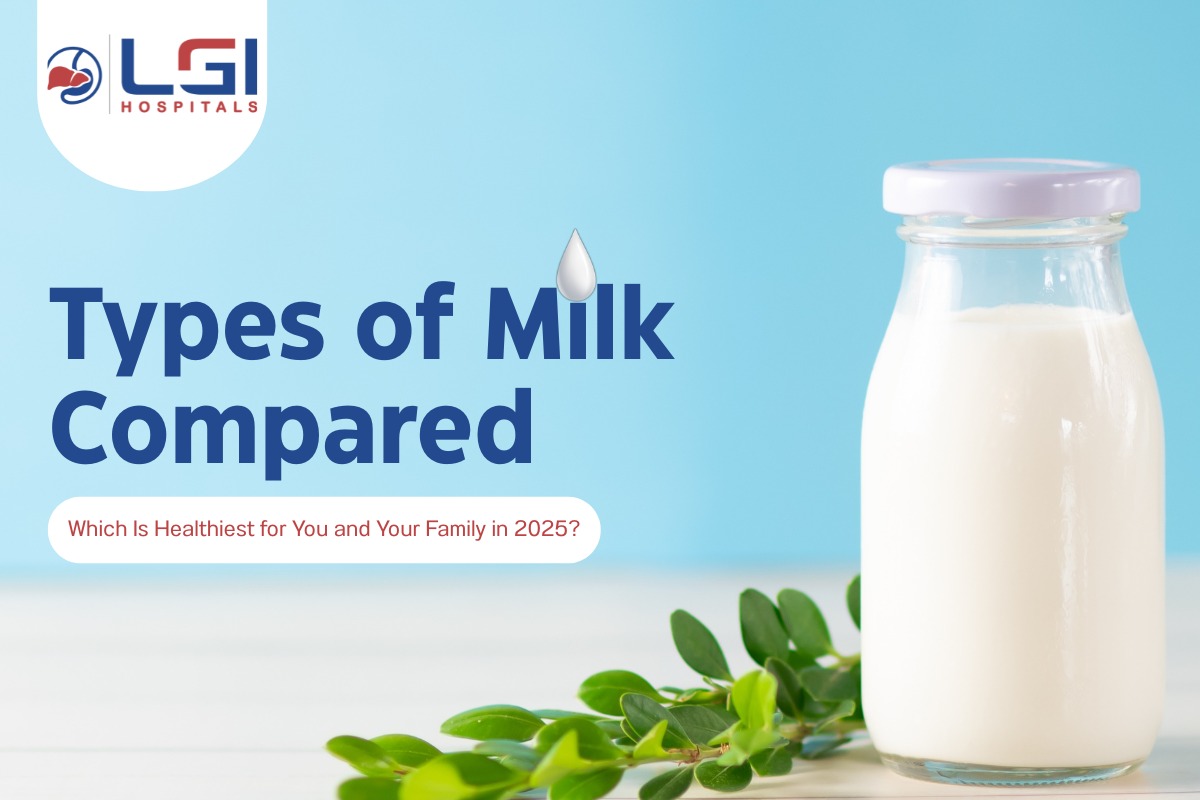Choosing the right milk has never been more important or more confusing. With a wide variety of dairy and plant-based options now available, each with its own benefits and drawbacks, understanding what’s best for your family’s health in 2025 is crucial. This guide compares the most popular types of milk, highlights their nutritional profiles, allergy considerations, and helps you pick the best fit for every family member.
Quick Comparison Table: Popular types of Milk at a Glance
| Milk Type | Calories (per 200ml) | Protein (g) | Fat (g) | Calcium (mg) | Allergy Risk | Highlights |
| Cow | 130 | 7 | 7 | 240 | High | Widely available, A1/A2 versions |
| Buffalo | 180 | 8.5 | 12 | 270 | High | Creamier, more calcium |
| Goat | 140 | 8.7 | 7 | 260 | Moderate | Easier digestion for some |
| Soy (fortified) | 80 | 7 | 4 | 200 | Medium | Plant, often fortified |
| Almond | 50 | 1 | 3 | 150 | Low | Low calorie, vitamin E |
| Oat | 90 | 2.5 | 1.5 | 120 | Low | Fiber, great taste |
| Coconut | 80 | 1 | 5 | 40 | Low | Unique flavor, lactose-free |
| Lactose-Free | 130 | 7 | 7 | 240 | Low | For lactose-intolerant |
| A2 Milk | 130 | 7 | 7 | 240 | Slightly lower | Easier digestion, A2 protein only |
Dairy Milks: Pros, Cons, and Best Uses
Cow Milk
- Best for: Most families needing a balanced protein and calcium source.
- Tip: Opt for A2 cow milk if concerned about digestibility or minor intolerances.
Buffalo Milk
- Best for: Children needing extra calories or bone strength.
- Consider: Higher fat makes it creamier but also richer in calories.
Goat Milk
- Benefit: Smaller fat globules can be easier to digest for some; similar nutrients to cow’s milk.
Plant-Based types of Milk: Nutrition and Suitability
Soy Milk (Fortified)
- Best for: Vegans, those with lactose intolerance, or seeking low fat/protein-rich alternatives.
- Pro Tip: Use calcium and vitamin D fortified versions.
Almond Milk
- Strengths: Low calorie, rich in vitamin E.
- Ideal for: Adults managing calorie intake or cholesterol.
Oat Milk
- Unique: Naturally sweet, contains some fiber.
- Good for: Heart health and those allergic to nuts.
Coconut Milk
- Notable for: Distinct flavor, low protein.
- Use for: Cooking, flavor variety (not as a main protein source).
Specialized Options: A2, Lactose-Free, and Fortified Milks
- A2 Milk: Only A2 beta-casein protein potentially easier on digestion.
- Lactose-Free Milk: Same nutrition as regular milk; ideal for lactose-intolerant.
- Fortified Milks: Especially soy/oat, boost calcium and vitamin D check labels!
Choosing the Right Milk: Age & Family Needs
Children
- Cow or buffalo milk (full fat) unless allergic/intolerant.
- If vegan or allergic: Fortified soy or oat milk (not almond, too low in nutrition for young kids).
Elderly
- Buffalo or fortified soy/oat milk for calcium, protein, easy digestion.
- People with digestion issues may benefit from A2 or lactose-free milk.
People With Allergies or Lactose Intolerance
- Lactose-free, goat, or plant milks.
- Always check if plant milks are nut/grain free for people with multiple allergies.
Frequently Asked Questions
Which type of milk is best for toddlers?
Cow or buffalo milk (full fat and pasteurized) is generally best, unless there’s a diagnosed allergy then use a pediatrician-approved, fortified plant milk.
Is plant-based milk healthier than dairy milk?
It depends! For protein and calcium, dairy or soy (fortified) do best. For allergies, vegan diets, or taste preferences, almond/oat/coconut are good choices just ensure they’re fortified and unsweetened.
Can adults and elderly drink the same milk as children?
Yes, but elderly may prefer lower fat and lactose-free varieties; always consider individual health needs.
What is A2 milk and how is it different?
A2 milk comes from cows that naturally produce only the A2 beta-casein protein, which some find easier on digestion than standard milk.
Is lactose-free milk nutritious?
Yes it’s regular milk with the lactose enzyme broken down, offering the same protein and calcium.
How should milk be stored?
Keep refrigerated after opening. UHT milks can be stored unopened at room temperature. Always check expiry dates.
Summary: How to Choose Smart in 2025
- Start by identifying family health needs: protein, calories, allergies, or intolerances.
- Compare nutrition using the provided table.
- Opt for fortified plant milks if going dairy-free.
- Consult your healthcare provider for young children, elderly, or specific medical needs.
- Always check labels for fortification, added sugars, and allergens.

